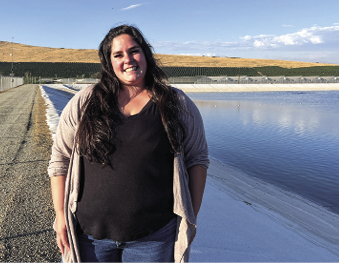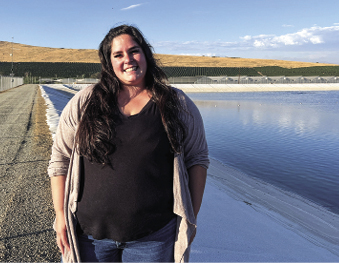YF&R member tracks water supplies, groundwater rules




By Christine Souza
(This is the first of a three-part series highlighting individuals in California Farm Bureau’s Young Farmers & Ranchers program.)
Drought in California means water is scarce. Yet for farmers and ranchers, there is no shortage of local, state and federal water regulations with which they must comply or face fines and/or penalties.
To navigate complex water rules, some of which are in various stages of implementation, many in agriculture are hiring help. This is where Trelawney Bullis of Fresno comes in. As manager of water, sustainability and geographic information system mapping for AC Foods in Dinuba, she oversees compliance of regulations for the business, which grows blueberries, citrus fruit and table grapes.
“I’m not scheduling irrigations or checking drip lines, but a big part of my job is keeping up with regulations and making sure our farms are in compliance and that we’re following the rules and tracking that water,” Bullis said. “It’s a lot of maintaining relationships and just making sure our voice, as an interested party, is heard in meetings.”
A focus for AC Foods, which grows crops from Arvin to Stockton in the San Joaquin Valley, is the Sustainable Groundwater Management Act. The state legislation, which took effect in 2015, lays out a process and timeline for local groundwater sustainability agencies, or GSAs, to manage water use and conservation for groundwater basins.
“I know which ranches sit in which GSAs,” she said. “I talk to our farming directors and ranch managers and make sure they understand the rules and regulations and what’s happening. I tell them I need X, Y, Z to make sure we’re still in compliance, so whether that is well logs or monthly water tracking, so that they know, OK, this is our allocation.”
AC Foods’ ranches sit within five different subbasins, and Bullis must attend meetings and keep track of information and regulations for as many as 12 GSAs.
“A ranch can sit in multiple boundaries. For example, I have a ranch that is in two irrigation districts and two GSAs but only one water-quality coalition, so just because a ranch is farmed together doesn’t mean each block has the same water entities governing it,” Bullis said. “For many farmers, whether the issue is time or money, it is difficult for them to stay up to date and informed, while at the same time, they are trying to operate a business and grow crops.”
Her work overseeing water involves short- and long-term planning. However, she said, “It’s hard to do long-term planning when you don’t know what the rules are going to be, but you have to make some assumptions to be able to plan for your crops for five, 10, 15, 20 years.”
Bullis grew up in Grass Valley, participating in 4-H and FFA. She said these youth organizations and her grandfather, an engineer, served as inspiration and steered her to a career in agricultural engineering. She earned a bachelor’s degree in bioresource and agricultural engineering from California Polytechnic State University, San Luis Obispo.
“I was always very interested in math and how things worked, and that led me to the ag engineering field,” she said. “I’m not that creative person, but give me a Sudoku, give me a puzzle, and I love it. I attribute that to my grandfather. He was an engineer, and I loved going over there and seeing his new inventions, and it was wonderful talking that through with him.”
After college and before her time at AC Foods, Bullis took advantage of other agricultural engineering opportunities in the Fresno area. At that time, Bullis said a friend introduced her to the California Farm Bureau Young Farmers & Ranchers, a leadership program for agriculturalists between the ages of 18 and 35.
“I am really involved with that and absolutely love it,” said Bullis, second vice president of the California Farm Bureau State YF&R committee who serves on the Fresno-Madera YF&R. “The program has provided me with so many opportunities that I can honestly say I would not be where I am today without it.”
Bullis said she is thankful for the various opportunities that the program offers.
“The advocacy opportunities are unlike other organizations, and I feel like my voice is being heard even though I am young and still relatively new in the water world,” Bullis said. “You truly get out what you put in, and I would encourage anyone to participate.”
Through YF&R and her participation locally in counties and as a member of the state committee, she said the group includes “a great community of people eager to see the agricultural industry succeed and persevere.”
“I have been able to learn so much from other members about their side of the industry and expand my knowledge to better inform people outside of the industry,” she said, adding that water is a common topic.
“Things are always changing. I talk about water all the time,” Bullis said. “I keep learning every day. I have a set of water people that I call, and we brainstorm and talk things through. I cannot emphasize enough the key role relationships play in my job.”
Bullis said she believes people increasingly look at water in the state as a commodity and as the top consideration on decisions for growing crops.
“It’s going to be, OK, how do I get the water to then produce the crop and how do I best utilize the water,” Bullis said, adding that she anticipates increased collaboration among farms for meeting regulatory requirements. “Farming is all about relationships, and a lot of it is about being good to your neighbors.”
(Christine Souza is an assistant editor of Ag Alert. She may be contacted at csouza@cfbf.com.)




